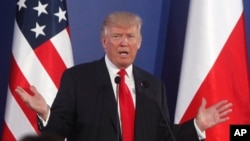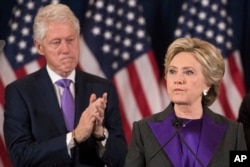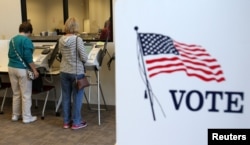President Donald Trump said Thursday that Russia might have meddled in last year's U.S. presidential election to help him win the White House, but that others also might have interfered.
"I think it was Russia and I think it could have been other people and other countries. Could have been a lot of people [who] interfered,” Trump said at a news conference in Warsaw before heading to the G-20 summit of leaders of the world's biggest economies in Hamburg, Germany. "Nobody really knows. Nobody really knows for sure."
Trump's statement is at odds with the more definitive conclusion reached by the U.S. intelligence community that Russian President Vladimir Putin personally directed a campaign to discredit the quadrennial U.S. election and to damage the reputation of Trump's opponent, former U.S. Secretary of State Hillary Clinton.
The intelligence finding was reached in August, three months before the November election, leading Trump to again question why his predecessor, former President Barack Obama, "did nothing about it."
Trump said, "Why did he do nothing about it? He was told it was Russia by the CIA — as I understand it. It was well-reported. And he did nothing about it. They say he choked. Well, I don’t think he choked — I think what happened is he thought Hillary Clinton was going to win the election and he said, 'Let’s not do anything about it.' Had he thought the other way, he would have done something about it."
Trump justified his skepticism about the intelligence community's conclusion about the Russian interference in the U.S. election by citing its incorrect analysis that Iraqi strongman Saddam Hussein was stockpiling weapons of mass destruction before the 2003 U.S. invasion toppled him.
"I remember when I was sitting back, listening about Iraq — weapons of mass destruction," Trump recalled. "How everyone was 100 percent sure that Iraq had weapons of mass destruction. Guess what? That led to one big mess. They were wrong. And it led to a mess."
The U.S. intelligence community concluded that Russia last year planted fake election-related stories throughout social media outlets in the U.S. and most prominently hacked into the computer files of Clinton's campaign chief, John Podesta.
The file-sharing, anti-secrecy group WikiLeaks subsequently released thousands of Podesta's emails almost every day in the weeks just before the election detailing embarrassing, behind-the-scenes efforts by Democratic officials to help Clinton win the party's presidential nomination.
Clinton has said the release of the emails was one of the reasons she lost the election, which national surveys had shown she was likely to win.
In a Warsaw speech that followed his news conference, Trump accused Russia of engaging in "destabilizing behavior" in world affairs, a claim Moscow rejected.
Trump is set to meet Putin for the first time Friday on the sidelines of the G-20 summit for face-to-face talks, but it remains uncertain whether the Russian election meddling will be discussed.
In Washington, several Democrats in the Senate said it would be a "severe dereliction" of Trump's role as the American leader if he did not confront Putin about Moscow's election interference.
Representative Adam Schiff of California, the top Democrat on the House Intelligence Committee, said that Trump, by equivocating on whether Russia interfered, "is not putting America first, but continuing to propagate his own personal fiction at the country's expense."
Numerous investigations of the Russian interference in the election are underway in the United States, including several in Congress.
Special counsel Robert Mueller is conducting a probe into whether Trump campaign aides illegally colluded with Russian officials to help Trump win and whether the president obstructed justice by firing the former head of the Federal Bureau of Investigation, James Comey, who was leading the Russia investigation before Mueller took over.
Trump said he was thinking of "this Russia thing" when he ousted Comey and has generally been dismissive of the investigations, saying that Democrats are using the Russian interference as an excuse for having lost the election.






